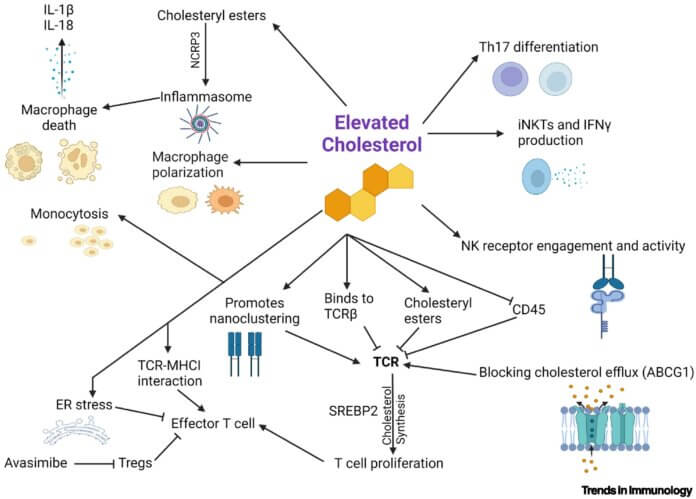In a groundbreaking discovery that sheds new light on the intricate relationship between cholesterol metabolism and immune responses in the heart, researchers have identified a key protein known as CRAT. This protein has been found to play a crucial role in regulating both cholesterol homeostasis and the innate immune system within the cardiovascular system. The findings of this study, conducted by a team of scientists from prominent research institutions, offer potential avenues for developing novel therapeutic strategies to address cardiovascular diseases. The study’s implications extend beyond cardiac health and hold promise for the treatment of various immune-related disorders.
Table of Contents
Unveiling the Role of CRAT:
The study, published in the prestigious journal Nature Medicine, presents a comprehensive investigation into the molecular mechanisms that connect cholesterol metabolism with the innate immune responses in the heart. Scientists have long recognized the importance of maintaining proper cholesterol levels for cardiovascular health, as elevated cholesterol can lead to the formation of plaques in the arteries, contributing to heart disease. However, the link between cholesterol metabolism and immune regulation within the heart has remained elusive until now.
Through a series of rigorous experiments utilizing both in vitro and in vivo models, the researchers demonstrated that CRAT, an enzyme previously associated with mitochondrial function, plays a critical role in orchestrating the delicate balance between cholesterol levels and immune responses in the heart. They found that CRAT functions as a key regulator of cholesterol transport within immune cells located in the cardiovascular system, such as macrophages.
Cholesterol Metabolism and Immune Crosstalk:
The study further unraveled the intricate crosstalk between cholesterol metabolism and the innate immune system. When cholesterol levels in macrophages were dysregulated, CRAT expression was significantly altered. This dysregulation triggered an inflammatory response, leading to the production of pro-inflammatory cytokines, which are known to exacerbate cardiovascular diseases. The researchers also observed that modulating CRAT expression had a direct impact on cholesterol efflux from immune cells, highlighting its crucial role in maintaining cholesterol homeostasis within the cardiovascular system.
Implications for Cardiovascular Health and Immune Disorders:
Understanding the role of CRAT in cholesterol metabolism and immune regulation opens up new possibilities for therapeutic interventions. By targeting CRAT, researchers could potentially develop novel drugs that restore cholesterol homeostasis while dampening excessive immune responses within the heart. This approach may hold promise for treating a range of cardiovascular conditions, including atherosclerosis, myocardial infarction, and heart failure.
Furthermore, the findings have broader implications beyond cardiac health. Given the emerging connections between immune dysfunction and various diseases, such as autoimmune disorders and chronic inflammation, manipulating CRAT could pave the way for new treatments in these areas as well. The study’s authors emphasize the need for further research to explore the full extent of CRAT’s impact on immune regulation in different organs and its potential therapeutic applications.
Investigating CRAT’s Mechanisms:
To gain further insights into CRAT’s mechanisms and its impact on cholesterol metabolism and innate immune responses, the researchers conducted a series of genetic and pharmacological experiments. By selectively manipulating CRAT expression in immune cells, they were able to observe direct effects on cholesterol transport and immune activation.
One key finding was that increasing CRAT expression in macrophages enhanced cholesterol efflux, the process by which excess cholesterol is transported out of cells. This finding suggests that upregulating CRAT activity could promote the removal of cholesterol from immune cells, reducing the formation of atherosclerotic plaques and mitigating the risk of cardiovascular diseases.
Conversely, when CRAT expression was reduced, cholesterol efflux was impaired, leading to the accumulation of cholesterol in macrophages. This build-up triggered the activation of inflammatory pathways and the release of pro-inflammatory cytokines, contributing to the development of cardiovascular inflammation and damage.
The Role of CRAT in Mitochondrial Function:
CRAT’s association with mitochondrial function has been well-documented in previous studies. Mitochondria, often referred to as the powerhouses of cells, are responsible for generating energy. However, recent research has unveiled additional roles of mitochondria in immune regulation and cholesterol metabolism.
CRAT, primarily located in the mitochondria, plays a pivotal role in fatty acid metabolism and energy production. This study’s findings highlight the intricate relationship between mitochondrial function, cholesterol metabolism, and immune responses in the heart. By modulating CRAT activity, researchers may be able to fine-tune mitochondrial function and restore cellular homeostasis, ultimately benefiting cardiovascular health.
Potential Therapeutic Implications:
The discovery of CRAT’s involvement in cholesterol metabolism and innate immune responses in the heart opens up exciting possibilities for developing targeted therapies. By manipulating CRAT expression or activity, it may be possible to restore cholesterol balance and dampen excessive immune responses, thus offering new avenues for treating cardiovascular diseases.
Current treatment strategies for cardiovascular diseases primarily focus on reducing cholesterol levels using statin medications. However, these medications may have limited effectiveness for individuals with persistent immune activation and inflammation in the cardiovascular system. Targeting CRAT could provide a complementary approach by simultaneously addressing both cholesterol metabolism and immune dysregulation.
Moreover, given the emerging connections between immune dysfunction and various diseases, including autoimmune disorders and chronic inflammation, the therapeutic potential of CRAT extends beyond cardiovascular health. By further exploring CRAT’s role in immune regulation across different organs, researchers may uncover opportunities for treating a wide range of immune-related disorders.
Future Directions
The groundbreaking study linking CRAT to cholesterol metabolism and innate immune responses in the heart opens up exciting avenues for research and clinical applications. As scientists delve deeper into the intricate interplay between cholesterol and immune regulation, novel therapeutic targets and strategies are likely to emerge. CRAT holds tremendous promise as a potential target for developing precision medicines that could simultaneously address cholesterol imbalances and immune dysregulation, offering new hope for patients with cardiovascular diseases and immune-related disorders.
Conclusion
In conclusion, the discovery of CRAT’s role in connecting cholesterol metabolism and innate immune responses in the heart represents a significant breakthrough in our understanding of cardiovascular health and immune function. This study not only contributes to the field of cardiac research but also opens doors to explore new treatments for immune-related disorders. As researchers continue to explore the therapeutic potential of CRAT, it is expected that future advancements will bring us closer to effective interventions and improved outcomes for patients suffering from cardiovascular diseases and beyond.
Image from: Nature.com



